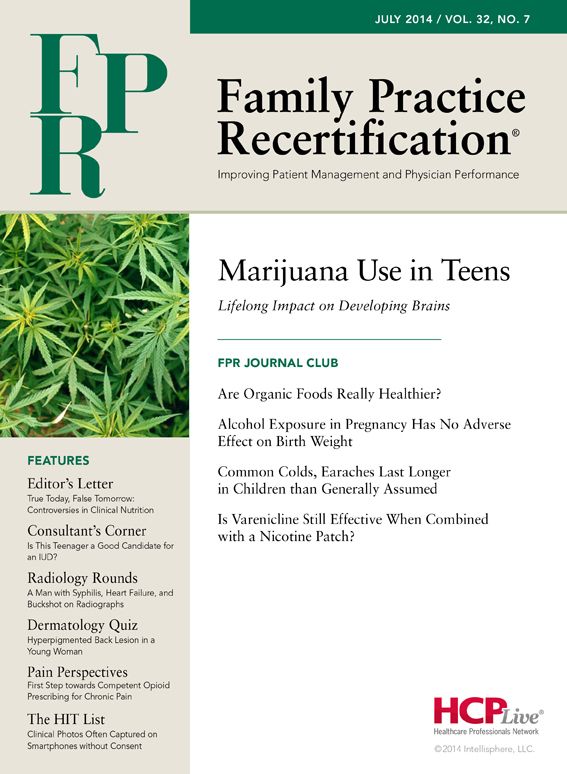Publication
Article
Family Practice Recertification
Are Organic Foods Really Healthier?
Author(s):
Crops raised in a method that meets the organic standard contain more antioxidants than traditionally grown crops. Nevertheless, it remains unproven whether diets with higher antioxidant concentrations provide improved health outcomes.
Frank J. Domino, MD
Review
Barański M, et al. Higher antioxidant and lower cadmium concentrations and lower incidence of pesticide residues in organically grown crops: a systematic literature review and meta-analyses. Br J Nutr. 2014 Jun 26:1-18. http://www.ncbi.nlm.nih.gov/pubmed/24968103.
This systematic review and meta-analysis evaluated peer-reviewed publications that describe the composition of organic and non-organic foods. In particular, the authors compared the concentrations of antioxidants in organically grown crops to those in conventionally grown crops.
Study Methods
The researchers utilized antioxidants as a measure based on a loose correlation previously found between plant-derived antioxidant intake and a reduced risk of chronic disease. Additionally, they evaluated and compared pesticide residue in organic and non-organic crops.
Results and Outcomes
A number of antioxidant concentrations were substantially higher in organic crops compared to those that did not meet the definition of organic. Pesticide residue was up to 4 times greater in conventional crops compared to those considered organic. Lastly, there were significantly lower concentrations of the toxic chemical, cadmium, in the organically grown foods.
On closer examination, the higher antioxidant and lower cadmium concentrations of the organically grown crops were linked to specific agricultural practices, such as avoiding mineral, nitrogen, and phosphorus fertilizers.
Conclusion
Organic crops had higher concentrations of antioxidants, lower concentrations of cadmium, and lower residues of pesticide residue than those raised in a non-organic fashion.
Commentary
As the obesity crisis spreads throughout the developing world, many theories have been construed as its cause. In the United States, one common marketing slogan implies consuming “organic” foods will lower the risk of disease and obesity. While there may be such a correlation, no data exists to hold it as fact.
Large cohort studies have suggested diets high in fruits and vegetables lower the risk of obesity and disease, while diets high in plant-based proteins correlate with lower rates of obesity. High fruit and vegetable intake has also been shown to correlate with lower risk of many cancers, including colon and breast cancers. Additionally, diets high in fish have been proven to lower the risk of heart disease.
This study demonstrated that crops raised in a method that meets the organic standard contain more antioxidants than traditionally grown crops. Nevertheless, it remains unproven whether diets with higher antioxidant concentrations provide improved health outcomes.
Even so, organic crops had lower concentrations of some heavy metals and lower incidences of pesticide residue in this study. Although it makes intuitive sense that exposure to these chemicals is unhealthy, no data have determined these very low levels of exposure are, in fact, harmful.
It would be wonderful to have strong data supporting the concept that high consumption of organically grown fruits and vegetables result in reduced rates of obesity, heart disease, and cancer. While this study is a step in that direction, it does not provide evidence of such outcomes.
For those who can afford the extra costs at the grocery store, consuming organic fruits and vegetables is potentially beneficial. But, until definitive data are discovered, do not confuse higher levels of antioxidants with reduced rates of obesity, cancer, and heart disease.
About the Author
Frank J. Domino, MD, is Professor and Pre-Doctoral Education Director for the Department of Family Medicine and Community Health at the University of Massachusetts Medical School in Worcester, MA. Domino is Editor-in-Chief of the 5-Minute Clinical Consult series (Lippincott Williams & Wilkins). Additionally, he is Co-Author and Editor of the Epocrates LAB database, and author and editor to the MedPearls smartphone app. He presents nationally for the American Academy of Family Medicine and serves as the Family Physician Representative to the Harvard Medical School’s Continuing Education Committee.



